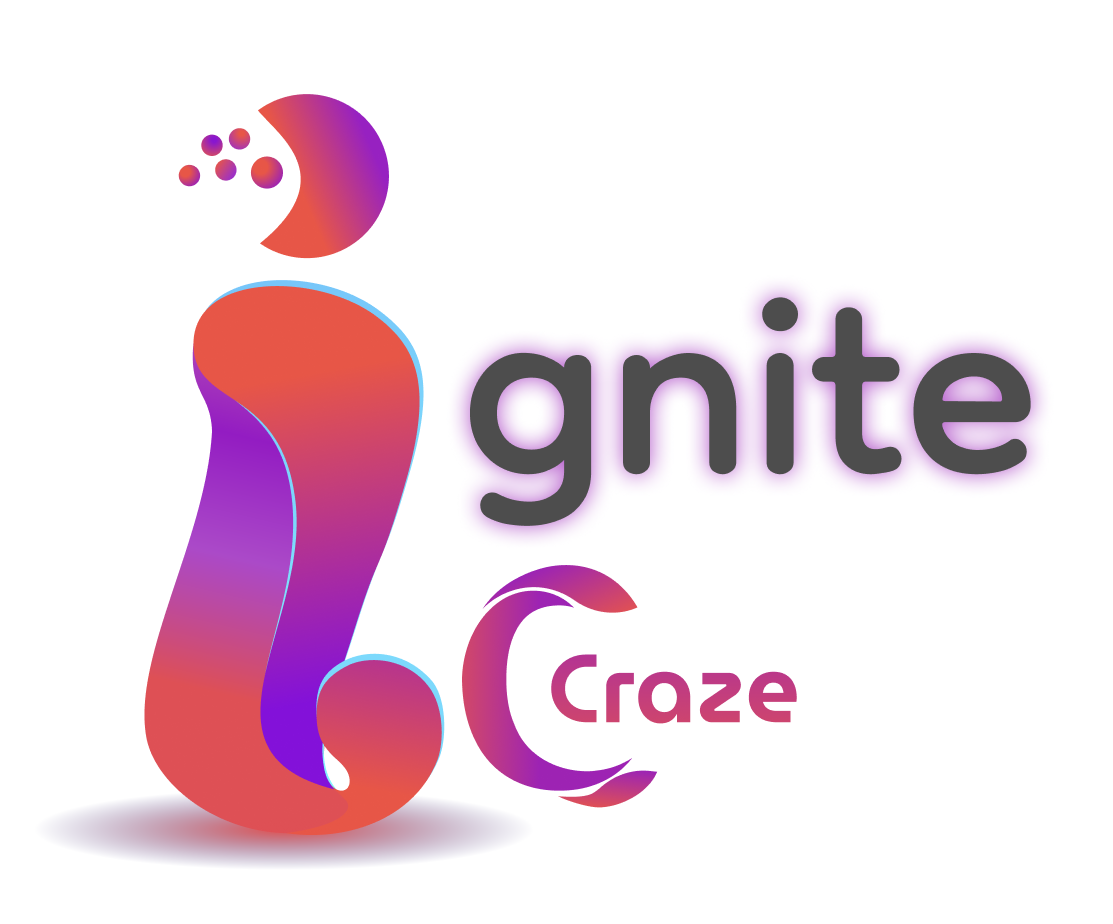Best 10 Amazon Inventory Management Tools to Meet Demand
The challenge with Amazon is managing your inventory levels. From laptop skins to face masks, you can sell almost anything there, and be profitable. The Amazon website has about 310 million users. Although you have a large global audience that you could potentially reach, having excessive stock isn’t a good idea. It is detrimental to your cash flow and dangerous.
It is easy to meet the customer’s demand with any of the following Amazon Inventory Management tools. Many of these tools can help you to be prepared for any season, not only by tracking the quantity of items in stock but also by sharing accurate forecasts.
1. Helium 10
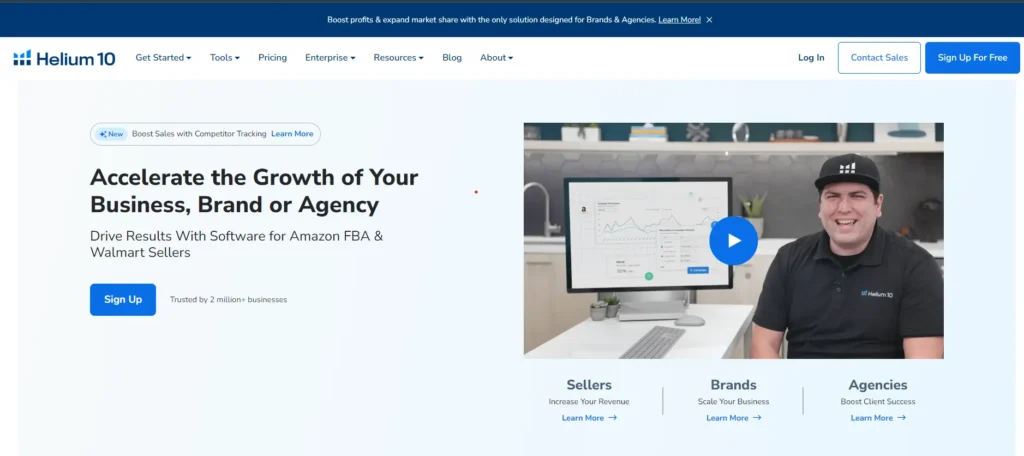
To quote Helium 10, you can consider it a “trusted sensei” for Amazon sellers, regardless of if they are experienced entrepreneurs or established businesses.
The software helps you grow your eCommerce business with a variety of features that are all-in-one. Initially, it was an innovative listing optimization tool, but its focus expanded to include marketing, inventory management, research, and inventory management tools.
In order to avoid having too much or too little stock at any given time, you can use it to predict trends if you are specifically looking for a tool to manage your inventory. In addition, it includes features like automatic quantity updates, restock recommendations, and custom presets.
Key Features
- An insights dashboard
- Multi-user login
- Product and keyword research
- Analytics
Pricing
There is a starting price of $29 per month for a limited inventory management service billed annually.
2. Veeqo
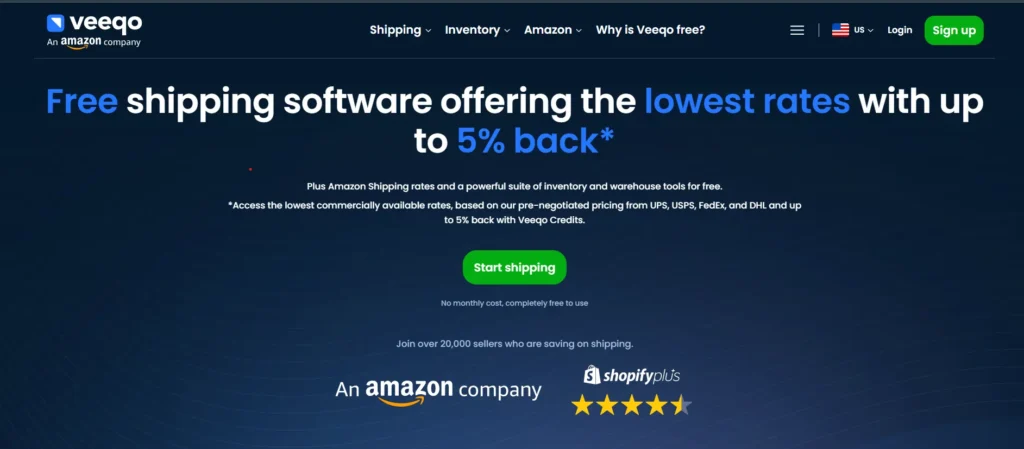
Inventory management tools are available on the market at reasonable prices and some of them are even free. There’s one condition, however, that you have to purchase most of your shipping labels through Veeqo. That makes it one of the most popular tools for eCommerce startups.
As well as Amazon integration, it integrates with Shopify, Walmart, and eBay, which makes it one of the best in the eCommerce world. One of the reasons why it is so great for Amazon sellers is that it is a company owned by Amazon. It’s also completely integrated with Amazon Buy Shipping. The negative feedback associated with that sale will be suppressed if the shipment was delivered on time, but the delivery was delayed.
Veeqo’s inventory management features will let you stay on top of stock movements by automatically tracking all stock items in a centralized area. You will be able to notice quickly as soon as you need to send more stock if you are using Amazon FBA.
Key Features
- Customizable warehouse workflows
- Inventory rules to automate routine tasks
- The ability to edit bundling components
- Adjustable account permissions using preset user roles
- Reporting
Pricing
Veeqo is available for free.
3. Brightpearl4
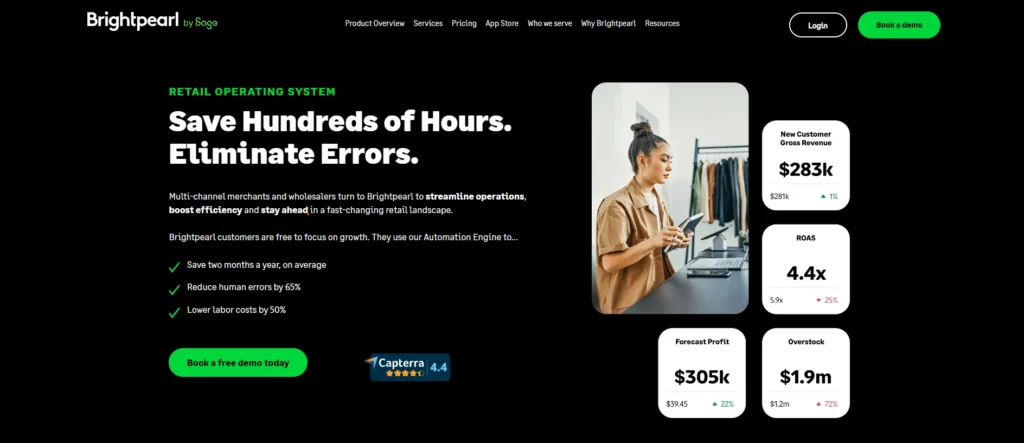
The market is full of inventory management tools that are reasonably priced, and some of them are even free. Veeqo, however, is one of the most popular tools for eCommerce startups because you have to buy most of your shipping labels through the service.
As well as Amazon integration, it integrates with Shopify, Walmart, and eBay, so it is one of the best eCommerce platforms available. In addition to being owned by Amazon, it is also completely integrated with Amazon Buy Shipping, making it a great choice for Amazon sellers. If the shipment was delivered on time but was delayed, the negative feedback associated with that sale will be suppressed.
As soon as you need to ship more stock, Veeqo’s inventory management features will alert you. With Veeqo’s inventory management features, staying on top of stock movement is a snap.
Key Features
- Customizable rules to automate workflows
- Inventory forecasting based on historical data from all your sales channels
- Real-time reporting
Pricing
You can request a quote via the company’s website. Pricing is customized based on your business needs.
4. SkuVault
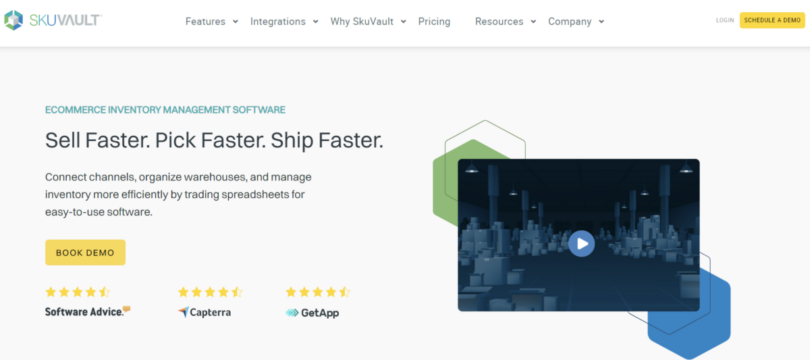
It offers a number of related services, but SkuVault chooses to focus on eCommerce inventory management alone. However, it is also rated as one of the best inventory management tools for Walmart, despite its limited scope. It integrates with Amazon and Walmart, and has been rated among the best inventory management tools for Walmart for years.
It pulls product and order information from the marketplace and creates pick lists with direct routes so that inventory quantity, including inventory in Amazon’s FBA, gets updated in real time. In addition to saving you time, dynamic locations can optimize space usage as well.
SkuVault users include Happy Feet, a family-owned business that sells specialty slippers. It was difficult for them to find a tool for managing several sales channels that their small staff could understand. Their top highlights include SkuVault’s flexibility, user-friendliness, and client support. With these features, they have been able to reduce the time they spend on fulfillment, which has given them more time to grow.
Key Features
- Simple workflows
- Barcode scanning
- Next-gen forecasting reports
- Barcode scanning
- Stock forecasting
- Kitting and bundling
Pricing
Brands generating more than 10,000 orders per month can get customized pricing starting at $449 per month for a maximum of 2,000 orders.
5. Linnworks
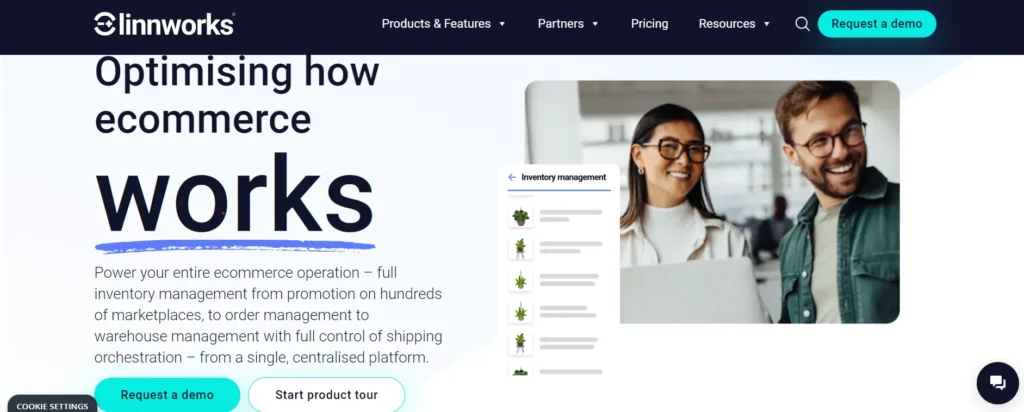
As a SaaS commerce platform that connects business systems, Linnworks assists its users to generate more revenue by offering multiple channels of distribution. Over a hundred integrations, such as Amazon, Walmart, and BigCommerce, are included in the system, which is trusted by thousands of customers.
It’s an excellent choice for B2B brands. Aside from setting B2B prices or discounts, you can also prioritize orders based on business orders. Once orders are dispatched, stock levels will be recalculated automatically.
Besides B2B companies, it has also enabled online businesses to sell across a number of different marketplaces, such as JAF Comics. Their retail store is 10 times bigger than their previous premise, and they have expanded their product range and their physical presence during the last decade by using Linnworks. As a result, they no longer had to worry about missing orders or updating listings individually, which allowed them to achieve this.
Key Features
- Listing management
- Automatic synchronization of price updates
- Automated workflows
- Payment mapping to track how customers pay for their orders
- Rule-based assignment of fulfillment and shipping partners
- Stock forecasting
- Insights
Pricing
You’ll need to book a demo to learn more about the pricing plans.
6. Expandly

As the name suggests, Expandly shines in the integration department. It supports multi-channel selling via Amazon, Etsy, and Wish, along with other big marketplaces such as eBay, Etsy, and Wish. Additionally, it integrates with more than a dozen shopping carts, shipping carriers, accounting software, and 3PL companies along with these marketplaces.
The application offers an intuitive user interface that lets you manage orders, inventory, and listings. You can also manage FBA listings and orders as well as services specific to the marketplace, such as gift wrapping.
If you plan to target a global audience, as well as push sales through multiple channels, it’s a great tool for you. Currently, it supports several Amazon regions, including the US, Canada, the UK, and others. Its development roadmap also includes the addition of more Amazon regions.
Key Features
- The ability to set reorder levels
- Returns management
- Kitting and bundling
- Reporting
Pricing
With a yearly contract, you can save about 10% if you choose to pay annually. Pricing starts at $510 per month when billed monthly.
7. Zoho Inventory
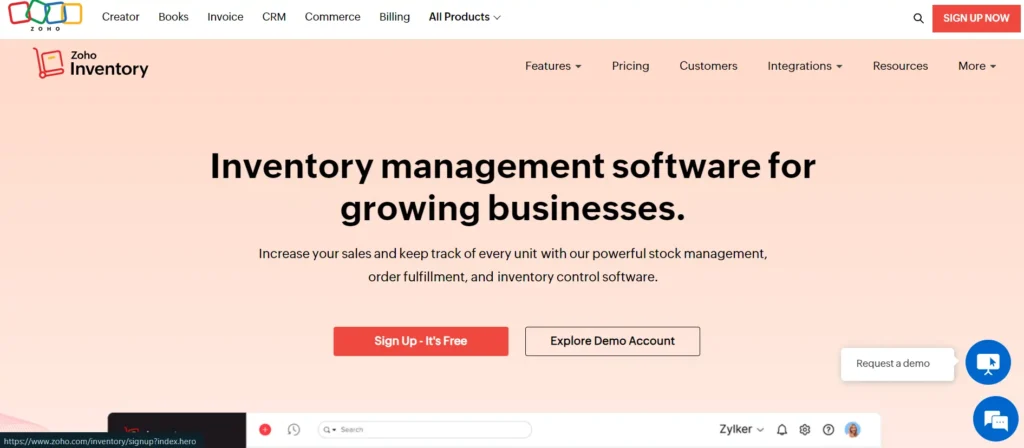
Besides email, Zoho offers a number of comprehensive tools like customer relationship management and inventory tracking.
Along with Linnworks, Veeqo, and SkuVault, it is rated as the best eCommerce inventory management platform, and it offers inventory and order management for Amazon, Shopify, Etsy, and eBay. Zoho is a versatile solution, whether you’re a retailer, wholesaler, or product-based business.
Zoho offers easy-to-follow instructions for integrating your Amazon Seller Central account with it. If you are using FBA, you can also create a warehouse for tracking your orders.
It’s now time to start tracking. Zoho is set up to automatically sync data every 30 minutes, so you don’t have to worry about keeping things up to date manually.
Key Features
- Low stock alerts
- A built-in client database
- A batch lot tracking feature
- Accounting integrations
Pricing
Small businesses can also take advantage of a free plan with a maximum of 50 users, allowing them to try it out for 14 days. The monthly price starts at about $40 per business.
8. Ordoro
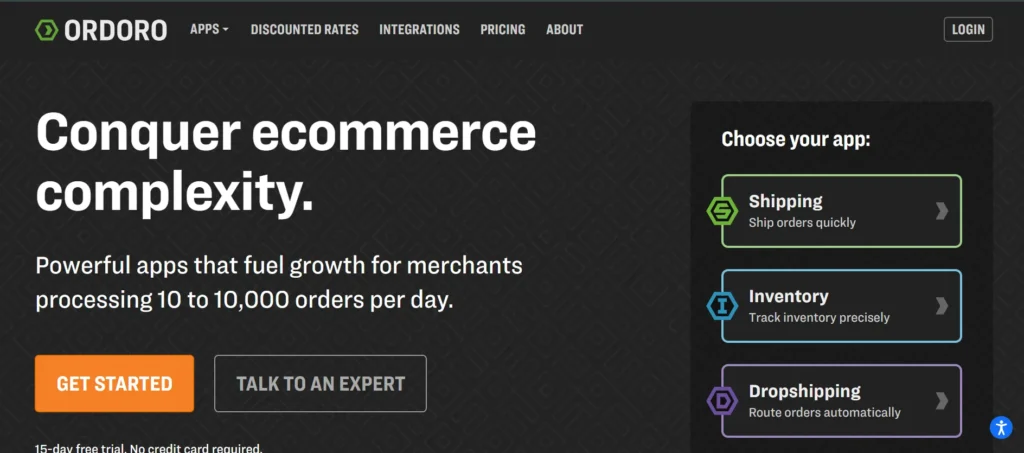
For multichannel sellers, Ordoro was recently ranked among the top inventory management systems by Forbes. As well as being able to integrate with various shopping carts, marketplaces, and accounting tools, it also allows users to integrate with suppliers, shipping carriers, and accounting tools.
This app tracks product quantities when you restock or when there’s a shipment outgoing. It will then let you know when you’re running low on certain SKUs. Customers have also praised its intuitiveness and customer support team.
Ordoro, for example, was able to handle inventory and shipping management on one platform when Brute Force Training needed a single platform. By switching to Ordoro, Brute Force Training described it as their single most impactful move, since everything was set up in a matter of days.
Key Features
- Automated low-stock alerts
- Kitting and bundling
- Multi-warehouse management
- FBA inventory sync
- Bulk inventory uploads
- Sales and operation analytics
- Reporting
Pricing
Ordoro offers a free plan, two subscription plans, and an enterprise solution for sellers that ship over 7,500 orders per month. Pricing starts at $59 per month.
9. SoStocked
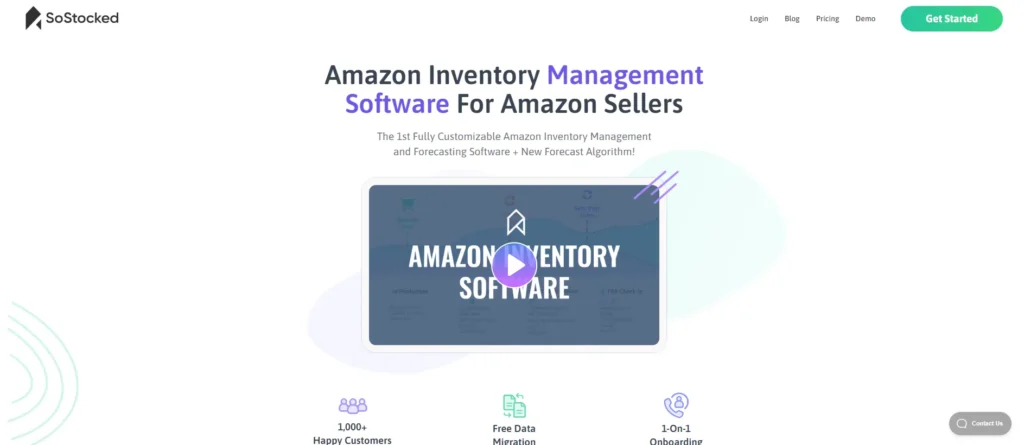
With SoStocked, you can manage your inventory and forecast your sales only on Amazon.
With its many common pain points solved, it is especially useful for forecasting, as it was developed by dozens of Amazon sellers for thousands of sellers. Rather than using a one-size-fits-all algorithm, it lets you customize your forecast modeling based on your unique business needs.
Key Features
- Reorder alerts
- Multi Channel fulfillment through Amazon
- Inventory dashboards
Pricing
Prices for enterprise customers managing multiple brands with different account owners start at $158 per month after a month of free trial.
10. Sellbrite
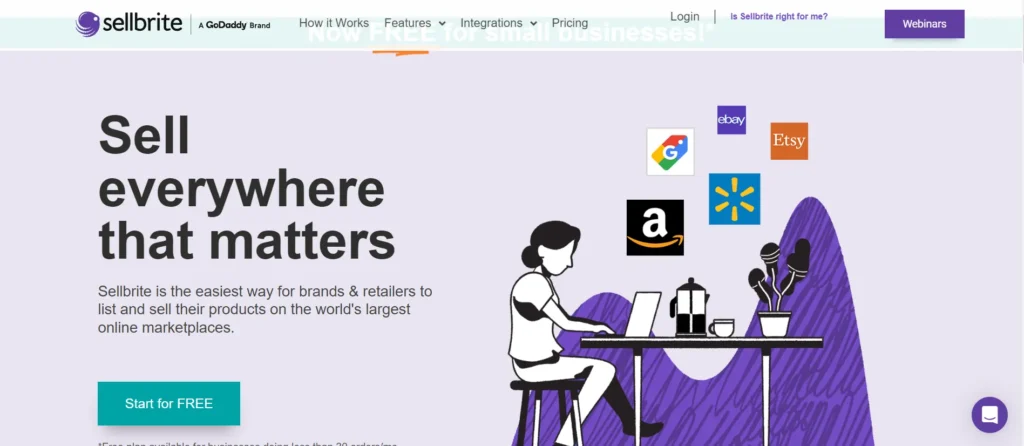
Additionally, Sellbrite offers a free plan for small businesses, making it a good option for inventory optimization for eCommerce brands. Aside from its benefits, one-click integrations with Amazon and other platforms make it easy to use.
With its automatic inventory sync, you’ll have the right amount of stock, and its bulk editor will reduce manual work. It can be used for a variety of use cases, including listing management, inventory control, fulfillment, and reporting. In addition to getting an overview of your stock level, you can ensure everything is still on track by using a centralized, user-friendly interface.
Key Features
- FBA inventory management
- Multi-warehouse automation
- Listing management
- Reports
Pricing
A 30-day free trial is offered by Sellbrite, and pricing starts at $19 per month after that. Businesses with 30 or fewer orders per month can have a free plan as well.
Wrapping Things Up
When you have a system in place to determine which popular products to sell, you have half of the battle won. There will be plenty of customers on Amazon if you know how to market to your target audience and know which products to sell. Following your clever marketing strategies, you’ll need to supply enough products to meet the demand.
It is highly recommended that you add one of these inventory software solutions to your tech stack whether you plan to stick solely with Amazon or expand to other platforms such as Walmart at a later point. With spreadsheets, you’ll never get a complete picture of your inventory like with these systems.
